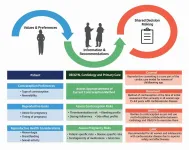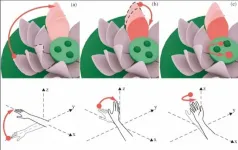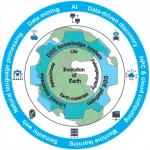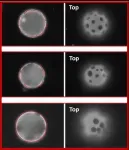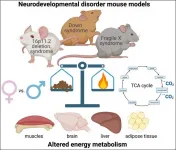Understanding how cancer can relapse
University of Missouri researchers discover a novel cell-to-cell communication network that helps tumors regrow following treatment.
2021-04-05
(Press-News.org) In the fight against cancers, activating mutations in the RAS family of genes stand in the way of finding viable treatment options. Now, scientists at the University of Missouri and Yale University have discovered that one of these mutations -- oncogenic RAS or RASV12 -- is also responsible for the regrowth of cancer cells following genotoxic therapy treatment, or drugs that cause damage to a cancer cell's DNA in order to eliminate it from the body.
"Most of our knowledge of how cells respond to DNA damage is mainly derived from studies looking at the single cell level," said Yves Chabu, an assistant professor in the MU College of Arts and Science. "Therefore, we don't know much about how tumor cells respond to DNA damage in the broader context of the tissue level, and what possible implications these responses might have on a tumor's relapse following genotoxic therapies. To address this, we looked at how tissues containing patches of cells carrying oncogenic RAS mutations respond to DNA damage. We focused on oncogenic RAS because it is associated with cancers relapse and resistance to genotoxic therapies in humans. This approach has allowed us to identify novel cell-to-cell communication within the tissue that instructs tumor cells in tissues to regrow. It's something we would not have identified if we were only looking at the single cell level."
Genotoxic therapies eliminate cancer cells by causing DNA damage inside those cells. Cells normally will stop multiplying and attempt to repair this DNA damage in order to avoid elimination, but if the damage is too extensive the cell will abandon the repair process and trigger its own demise. Cells rely on a molecule called "p53" to execute these outcomes.
"We found that in oncogenic RAS tissues, cells elevate the levels of the p53 protein to varying degrees in response to DNA damage," said Chabu, whose appointment is in the Division of Biological Sciences. "Further analyses revealed that cells with high p53 protein levels, or more extensive DNA damage, do not simply die in response to the DNA damage. Instead, they release a growth signal called interlukin-6 into the tumor environment. Interlinkin-6 instructs cells with low p53 levels, or cells with less DNA damage, to activate JAK/STAT, a growth-amplifying signal, and drive tumor regrowth after treatment. We essentially have a situation where cells that are vulnerable to the treatment are instructing the more robust cells to take over and grow."
Chabu, who has been studying oncogenic RAS mutations for more than a decade, said their findings suggest that adding JAK/STAT inhibitors to genotoxic therapies will limit the ability of RAS tumors to regrow. He said another interesting aspect of their findings is that p53 is traditionally considered as a tumor suppressor protein.
"A loss of p53 activity, due to genetic mutation, causes cells to grow uncontrollably while accumulating even more DNA mutations," Chabu said. "So, naturally one would think that having more p53 activity is a good thing because it prevents pre-cancerous cells from growing and forming cancers. Yet, here we find that too much of a normal, not mutated, p53 can signal the surrounding RAS tissues to overgrow."
While scientists have been studying mutations in RAS genes for more than three decades, scientists today have a better understanding of how these mutant genes work. However, many of them still consider these mutations to be "undruggable" or resistant to therapeutic treatment, according to the National Cancer Institute.
INFORMATION:
The study, "Cooperation between oncogenic RAS and wild-type p53 stimulates STAT non-cell autonomously to promote tumor radioresistance," was published in Communications Biology, a journal published by Nature Research. The work was supported in part by the Howard Hughes Medical Institute and start-up funds from the University of Missouri. The content is solely the responsibility of the authors and does not necessarily represent the official views of the funding agencies.
[Attachments] See images for this press release:

ELSE PRESS RELEASES FROM THIS DATE:
2021-04-05
URBANA, Ill. ¬- If your day started with a cup of coffee, there's a good chance your morning brew came from Colombia. Home to some of the finest Arabica beans, the country is the world's third largest coffee producer. Climate change poses new challenges to coffee production in Colombia, as it does to agricultural production anywhere in the world, but a new University of Illinois study shows effects vary widely depending on where the coffee beans grow.
"Colombia is a large country with a very distinct geography. The Andes Mountains cross the country from its southwest to northeast corner. Colombian coffee is currently growing in areas with different altitude levels, and climate impacts will likely be very different for low ...
2021-04-05
Pregnancy can increase the risk of morbidity and mortality in women with cardiovascular disease; however, many cardiologists are not having pre-pregnancy contraception discussions with their patients of child-bearing age. There is a need to provide evidence-based guidance for contraceptive safety and effectiveness and pregnancy planning options for this high-risk patient group, according to a paper published in the Journal of the American College of Cardiology (JACC). This paper is one of a five-part JACC focus seminar series addressing a wide range of topics in the emerging cardio-obstetrics field.
Prior research has found that 68% of females have had sex at least once by the time they were 17, ...
2021-04-05
A recent study proposed a three-dimensional LotusMenu that can "bloom in the palm". With this menu, even if you are not Nezha, you can also control your own lotus.
The research paper is titled: "LotusMenu: A 3D Menu using Wrist and Elbow Rotation Inspired by Chinese Traditional Symbol". It's published in SCIENCE CHINA Information Sciences recently, written by Associate Professor Lu Fei's human-computer interaction research team from Beijing University of Posts and Telecommunications. Based on the metaphor of the traditional lotus pattern, the researchers ...
2021-04-05
The Bureau of Reclamation today released final technical reports supporting the Water Reliability in the West - 2021 SECURE Water Act Report. Reclamation's 2021 West-Wide Climate and Hydrology Assessment and seven individual basin reports provide detailed information on climate change impacts and adaptation strategies to increase water supply reliability in the West. A new 2021 SECURE Report Web Portal is also available to provide a user-friendly, web-based format for delivery of information in the reports.
"Western water supply and delivery systems are affected by changing hydrologic conditions and competing demands," Deputy Commissioner Camille Calimlim Touton said. "These reports highlight Reclamation's effort to use ...
2021-04-05
Humans have long explored three big scientific questions: evolution of the universe, evolution of Earth, and evolution of life. Geoscientists have embraced the mission of elucidating the evolution of Earth and life, which are preserved in the information-rich but incomplete geological record that spans more than 4.5 billion years of Earth history. Delving into Earth's deep-time history helps geoscientists decipher mechanisms and rates of Earth's evolution, unravel the rates and mechanisms of climate change, locate natural resources, and envision the future of Earth.
Two common approaches, deductive reasoning ...
2021-04-05
Researchers from North Carolina State University have developed an exosome-coated stent with a "smart-release" trigger that could both prevent reopened blood vessels from narrowing and deliver regenerative stem cell-derived therapy to blood-starved, or ischemic, tissue.
Angioplasty - a procedure that opens blocked arteries - often involves placing a metal stent to reinforce arterial walls and prevent them from collapsing once the blockage is removed. However, the stent's placement usually causes some injury to the blood vessel wall, which stimulates smooth muscle cells to proliferate and migrate to the site in an attempt to repair the injury. The result is restenosis: a re-narrowing of the blood vessel previously opened by angioplasty.
"The ...
2021-04-05
ITHACA, N.Y. - The cost of harvesting solar energy has dropped so much in recent years that it's giving traditional energy sources a run for their money. However, the challenges of energy storage - which require the capacity to bank an intermittent and seasonally variable supply of solar energy - have kept the technology from being economically competitive.
Cornell University researchers led by Lynden Archer, Dean and Professor of Engineering, have been exploring the use of low-cost materials to create rechargeable batteries that will make energy storage more ...
2021-04-05
AMHERST, Mass. - A team of polymer science and engineering researchers at the University of Massachusetts Amherst has demonstrated for the first time that the positions of tiny, flat, solid objects integrated in nanometrically thin membranes - resembling those of biological cells - can be controlled by mechanically varying the elastic forces in the membrane itself. This research milestone is a significant step toward the goal of creating ultrathin flexible materials that self-organize and respond immediately to mechanical force.
The team has discovered that rigid solid plates in biomimetic fluid membranes experience interactions ...
2021-04-05
Mouse models of neurodevelopmental disorders possess unique, sex-specific metabolic dysfunctions, according to a new study in eNeuro. Understanding the unique metabolic effects of each disorder in both animal models and humans may lead to more personalized treatments and diagnostic methods.
Any disorder affecting the brain also impacts the body. People with neurodevelopmental disorders -- including Down syndrome and autism spectrum disorders -- are at increased risk for developing diabetes, obesity, and hypertension. Yet the impact of these three disorders on metabolism has not been studied.
Menzies et al. measured the resting energy metabolism of three neurodevelopmental disorder mouse models: Down syndrome, ...
2021-04-05
A new report by AARP Pennsylvania and Drexel University's College of Nursing and Health Professions highlights how geographic, racial/ethnic and economic factors are combining to restrict access to health care services for many Pennsylvanians, creating disparities that have become more pronounced during the COVID-19 pandemic.
"Disrupting Disparities in Pennsylvania: Retooling for Geographic, Racial and Ethnic Growth" shows that health inequities are most acute among those living in rural and low resourced areas of the state, and among underrepresented populations (particularly Black/African American and Latino), who lack access to health care, experience digital divide and face persistent ...
LAST 30 PRESS RELEASES:
[Press-News.org] Understanding how cancer can relapse
University of Missouri researchers discover a novel cell-to-cell communication network that helps tumors regrow following treatment.


